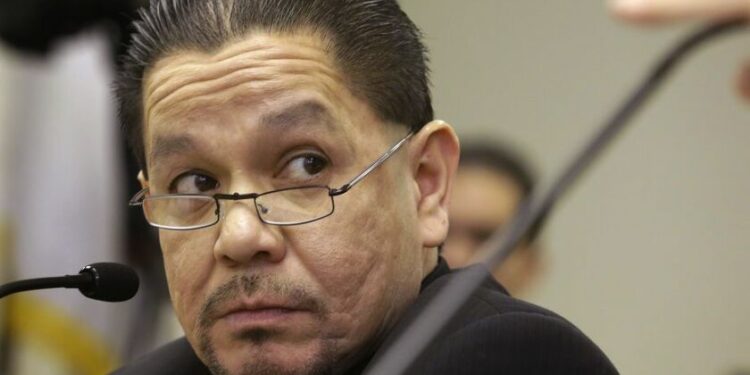The jury considering the bribery allegations against former AT&T Illinois President Paul La Schiazza told a judge Thursday they fear they are at a “stalemate” — but their deliberations are still ongoing.
U.S. District Judge Robert Gettleman encouraged the panel around 10:30 a.m. to keep working toward a verdict, but added that, “we can get back together this afternoon to determine whether or not you’re able to do that.” The group then returned to their deliberation room.
The jurors’ full note read: “What happens if we feel we are at a stalemate and feel it will not change?”
Earlier Thursday, before the jury entered the courtroom, Gettleman told attorneys in the case,“I don’t see keeping them here beyond today.” The jury has been deliberating for about 11 hours over three days.
La Schiazza’s trial is the latest to result from the feds’ sprawling, decade-long investigation of state and city government, which long had former Illinois House Speaker Michael J. Madigan at its center. It offered yet another preview of the feds’ evidence just weeks before Madigan faces a jury himself on Oct. 8.
But a failure to secure a conviction would be a new setback for prosecutors heading into that landmark case.
Madigan spent one day of La Schiazza’s trial five floors directly below the courtroom, preparing for his own racketeering conspiracy case with lawyers and a judge.
Prosecutors say La Schiazza bribed Madigan by paying $22,500 to former state Rep. Edward “Eddie” Acevedo in 2017, just as AT&T sought a legislative victory that had eluded it for years. The feds say Madigan wanted to help Acevedo because of the increasing Latino population in Madigan’s district.
“Madigan wanted to help Eddie Acevedo so that Eddie Acevedo could help Madigan,” Assistant U.S. Attorney Sushma Raju alleged in her closing argument.
Defense attorneys stressed the lack of evidence proving that AT&T paid Acevedo in exchange for Madigan’s help with the bill.
Jurors seemed to quickly focus on that question earlier in their deliberations. They sent a note to the judge Wednesday morning asking whether the law requires proof of such an exchange.
The question is:
“The government indicates that for a bribe there only needs to be ‘intent’ and no exchange. Is this consistent with the law?”
— Jon Seidel (@SeidelContent) September 18, 2024
Prosecutors built their case largely out of emails gathered from AT&T, as well as testimony from longtime AT&T lobbyist Stephen Selcke. Tom Cullen, a Springfield veteran who also turned to lobbying after working for Madigan, provided additional key testimony.
Jurors wound up hearing from more than a dozen witnesses over four days. Then they listened to three hours of closing arguments in which prosecutors aimed to put all the pieces together.
The key players in the scheme involved Michael McClain, Madigan’s longtime friend who was widely seen as Madigan’s messenger in Springfield, and Acevedo, who became a member of Madigan’s leadership team during his 20 years in the Legislature.
McClain has already been convicted for a separate bribery scheme aimed at Madigan, and he faces trial again alongside Madigan next month. Acevedo served a six-month prison sentence in 2022 for tax evasion.
At the heart of the La Schiazza case was legislation meant to help end AT&T Illinois’ costly obligation to provide landline telephone service to all Illinois residents. It was known as its Carrier of Last Resort, or COLR, bill.
McClain reached out to AT&T Illinois looking for a small contract for Acevedo in February 2017. Then, two days later, McClain told La Schiazza that Madigan had assigned McClain to the COLR legislation as a “special project,” emails showed.
The contract for Acevedo suddenly became an urgent issue for La Schiazza more than a month later, on March 28, 2017, when he told his team he “got a call” and wanted them to “move quickly” on Acevedo’s contract.
Thing is, no one at AT&T Illinois was particularly impressed with Acevedo. The longtime lawmaker had a bad reputation, and Republicans threatened to vote against AT&T’s agenda if Acevedo wound up on the utility’s payroll.
So the utility wound up funneling Acevedo’s money through Cullen’s firm. La Schiazza told his staff he had no objection to the arrangement, “as long as you are sure we will get credit and the box checked, and of course we have legal approval to engage Eddie this way.”

The COLR bill became law after the state House and Senate voted around July 1, 2017, to override a veto from then-Gov. Bruce Rauner. Madigan voted in favor the bill, and to override the veto.
Less than two weeks later, on July 12, 2017, La Schiazza was asked by Madigan’s son, Andrew Madigan, to sponsor a nonprofit event “at the suggestion of our good friend Mike McClain.” La Schiazza griped by email to a colleague that, “this will be endless.”
He later added, “we are on the friends and family plan now.”
Raju argued Tuesday that La Schiazza’s comments proved the exchange of Acevedo’s job for passage of the COLR bill. She called the emails an “after-the-fact discussion of what [La Schiazza] did and why he did it.”
“It’s not building goodwill,” Raju said. “It’s not just kissing up to Madigan. These are acknowledgments that [La Schiazza] and AT&T were of the mindset that they needed to bribe Madigan to move the COLR bill forward.”
Source link : http://www.bing.com/news/apiclick.aspx?ref=FexRss&aid=&tid=66ec560b360640f3aa5a30f7b99d5ad7&url=https%3A%2F%2Fchicago.suntimes.com%2Fchicago-corruption-trials%2Fusa-v-paul-la-schiazza%2F2024%2F09%2F19%2Fverdict-trial-ex-at-t-illinois-exec-bribing-michael-madigan&c=12233802013572294044&mkt=en-us
Author :
Publish date : 2024-09-18 13:00:00
Copyright for syndicated content belongs to the linked Source.




